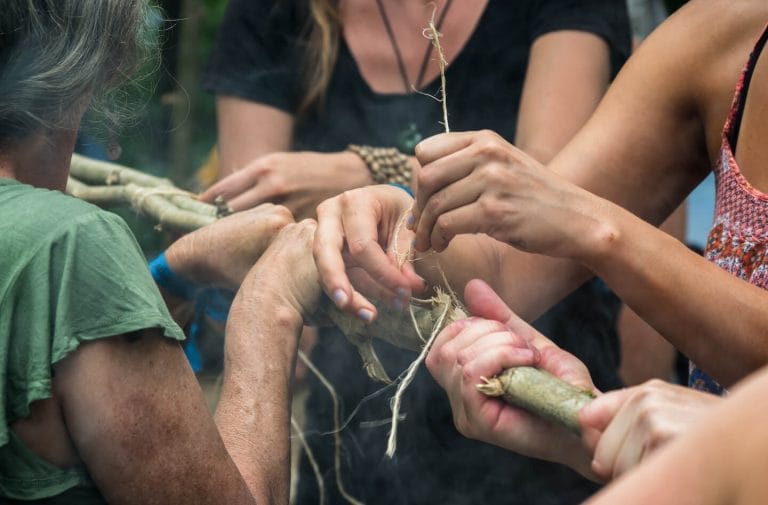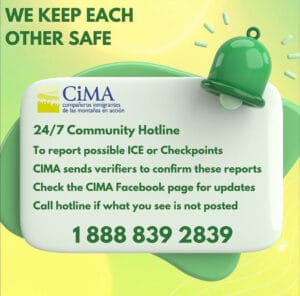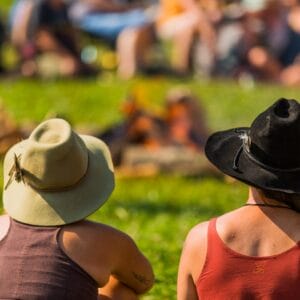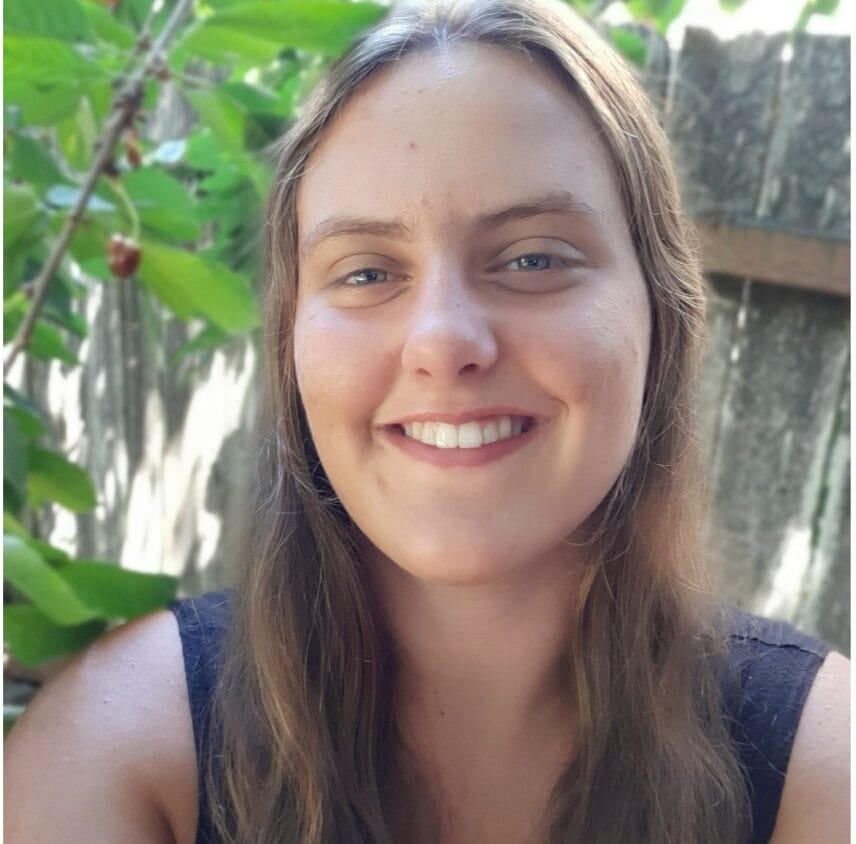A movement is growing. It has no name. It aligns with no party. It has no leader. It needs none.
This is a movement of people of all colors, from all classes and all backgrounds. It’s a movement to reclaim our identities, our livelihoods, our freedom, our abilities, our health, our communities and our connection to the materials and life on this land that sustain us.
Freedom, Happiness, and Wealth: Accurate Association or Illusion?
Americans pride themselves on their freedom, but Americans have been losing their knowledge of how to live well and with the land for generations. It is not freedom to greatly depend on those who do not have your most central and basic interests at heart for your own livelihood. That is something else.
The Greek philosopher Plato saw a slave as anyone “who accepts from another the purposes which control his [or her] conduct.” Could it be that this applies to many or most people in the modern developed age? Subtly and consistently, all American consumer choices and therefore lifestyles are becoming increasingly limited and guided by the people in charge.
I would like to explain some of the extent to which our life decisions are influenced by unknown faces. If you’re like me and enjoy learning tidbits of history with a healthy dose of context, let me introduce Neoliberalism, which tremendously affects the way each of us thinks and conducts our lives each day.
Neoliberalism is a long-standing American political philosophy and way of life which values market-based politics, economic decentralization, utilitarianism and competitive markets. While its intentions were to create an economic environment which encouraged efficiency, growth, technological advancement and income distribution, it has deeply shaped our culture in many ways and not all for the best.
Lifestyles of idolized Americans – those who exemplify the potential of the Neoliberal American dream – express the importance of associating wealth with freedom.
Within this framework, in order to pursue security, life, liberty, and happiness, one must pursue production, consumption, profits and surplus.
“Success” in Public Schooling
The neoliberal equation has shaped the culture of success so much that it has permeated the heart of our education system. In public schools, learning is seen as a model for work preparation as students are transformed into human capital for future employment. We see this in the explanations that parents often give their children in encouraging or threatening them to do well in school. I remember many occasions in my own life as early as kindergarten when the children in the class were asked the classic and well-intended question, “and what do you want to be when you grow up, dear?” I remember my teachers’ disappointment when, given this question as a drawing assignment, I drew a picture of a happy woman and child in a sunny vegetable garden saying, “I want to be a great mom!” They were much happier when I told them that I wanted to be an engineer or a doctor.
The connection between wealth and happiness is an illusion painted for many of us all our lives.
When students experience schooling grounded in neoliberal ideas and values, they learn to value economic self-gain above all else. We in the earthskills community believe that the “all else” is rather important indeed. What place should other priorities such as our own health and that of our soil, air and water have in our lives and in our education? What place is held for our personal growth, community and land stewardship, social justice, and spirituality?
Living with Less Money
While we are challenging the wealth-equals-happiness idea, I do need to give a voice to the struggles of financial hardship. The challenges faced by those in poverty are tremendous and tragic. The emotional realities of poverty are often beyond the understanding or reach of the privileged.
Wealth inequality is bad, worse than you think it should be and worse that you think actually is. Even worse than that, the inequality gap is growing still and is even greater worldwide than it is here in the decadent and infamous USA. If you’re curious to learn more about the wealth gap in the US, I would recommend this short video.
I feel that I need to clarify an assumption I am making about you – the reader of this article. I am going out on a limb and assuming that you are not of the 1%, or even of the top 25%. If I am wrong, please consider contacting the Firefly sponsorship and scholarship coordinator; our community of skill seekers and sharers could use your support.
To the rest of us, Living a lifestyle with less money doesn’t have to be accompanied by financial insecurity, decreased health and fewer opportunities.
Skills Liberate Us to Live Better
While often romanticized, living “off the land” is not an all-or-nothing opportunity. It is not only for the eccentric white hippie or the country bumpkin. We all do it, actually, as all of our food and life materials still come from this planet. People who have picked up a thing or two from earthskills have often found that they can live a more fulfilled and comfortable life with less money. To highlight an extreme, some individuals who have immersed themselves in earthskills and live heavily “off the land” actually comfortably live on less than 10k or even 2k a year, which doesn’t even cover gas money for some people. Most interesting of all, these folks consider themselves living an abundant life rich in food, resources and a strong community.
Earthskills can teach us how to find, make, grow, raise, care for, and fix much of what we need in our daily lives.
- Make your own containers to carry your stuff around by exploring basket weaving, sewing and leatherwork.
- Learn how to carve or blacksmith your own eating and cooking utensils. Make and mend your own clothing, straps and ropes with fiber arts – from working with wool straight off a sheep’s back to tanning a deer hide.
- Supplement your food budget by learning how to forage highly nutritious, medicinal and abundant life from the forest and fields.
- Expand your gardening knowledge and grow and prepare more of your own produce at home.
- Localize your energy sources and learn how to start and manage fire safely so you can heat, cook and make tools for yourself.
- Use local and salvaged materials to lower your housing expenses by planning and building smaller indoor living spaces designed to bring you sunlight at the right times of day and year.
- Learn how to identify well-made items and tools so that you know how to find one that will last you a lifetime, rather than supporting products designed to fail so you will buy them again.
These are a few examples of many that exemplify each of our potential to live a more skilled, meaningful and connected life, and one with a smaller budget.
Learning earthskills is about more than picking up hobbies. Earthskills help us explore a better life and free ourselves from the limitations inflicted by the illusion that wealth and excessive consumption equals happiness. We can each learn how to support and manifest our own high quality life from the materials and life all around us. We can claim our freedom to care for ourselves and one another as well as this land that gives us life. Not only does this add meaning, connection and the security of self-reliance, but we reclaim our power to self-sustain as individuals and communities.
Earthskills change lives. Join the movement. Liberate yourself.
